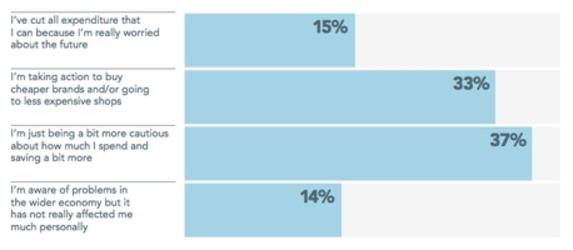The opportunity of change
All of these changes would have significant cultural and business impacts. What happened in the 1970s demonstrates that austerity and challenging economic difficulties do not preclude high levels of change and innovation – in fact, they make them more important than ever.
Most interestingly of all, many of the changes in the 1970s occurred in cyclical business areas – i.e. those most affected by the recession. In one sense, this is not surprising. Many probably faced an ‘evolve or die’ situation. In addition, redundancies in certain sectors liberated entrepreneurs to create new businesses.
In this piece, I’ll take a look at a couple of those cyclical areas of business and draw parallels between the changes that occurred in the 1970s and those happening today. In particular I’ll focus on holidays and leisure (in the form of eating out) and then look more generally at the impacts of disintermediation of businesses.
The birth of package holidays
In 1971 Britons took four million holidays abroad; by 1981, that figure had more than trebled to 13m.
The era of the package holiday arrived in the late 1960s and companies such as Clarksons dominated the early 1970s. They were the first to offer overseas travel to the masses (with one week’s full board in Majorca for £50 ) and in doing so played what we would see as the role of ‘brand as facilitator’. Unfortunately the three-day week, inflation, the sinking pound and troubles in Portugal and Greece forced the company into administration in August 1974. In economic terms the parallels with the current troubles of Thomas Cook and others are all too clear.
The holiday sector was one of the first to be affected by the internet. Continued innovation by new entrants to the market has kept the pressure on established players to adapt and respond to new models. Many consumers now want to unpackage their holidays. So package holiday operators face a triple whammy: difficult trading conditions, increased consumer empowerment and innovation from new brands.
The start-up mentality of these newer rivals make them more willing to launch, learn and iterate their models rather than wait until the offering is fully formed. The birth and evolution of AirBnB, (a community website for people to list and book unique accommodation) is a good example of this.
This decade is likely to see a further erosion of the package holiday market as the internet makes organising holidays directly with owners of properties abroad simpler and easier. The unpackaging trend is gaining momentum.
Leisure – dining trends in the 1970s
The 1970s saw a major change in UK dining. American restaurants revolutionised fast food, which hitherto had been confined to fish-and-chip shops and the odd Indian or Chinese takeaway. The first McDonald’s opened in Woolwich in 1974 and the first Burger King in central London in 1977. These were to herald a seismic change in eating habits, triggering the proliferation of a diverse array of fast-food outlets.
Our more recent economic downturn has greatly affected the dining-out market again. Many mass-market chains and pubs have been forced to compete with relentless price promotions. Many private restaurants have suffered. However this has resulted in innovation. With little capital, resources or planning needed, chefs and bar owners have been experimenting with new menu items, restaurant themes and locations. There has been a marked growth in pop-up (or temporary) food venues – reliant on the power of social media for their PR needs.
Disintermediation and the service sector
In the 1970s it was the manufacturing industry that was disintermediated. Today, it will be service industries that are most affected.
Even previously impregnable sectors like the legal profession can expect disruptive change. The so called ‘Tesco law’, enacted last October, now allows high street retailers to offer legal services to their customers. Many other businesses and professions (including market research) will also change in the coming decade, resulting in new ranks of the unemployed – but this time from the service sector.
It’s clear this decade is going to be one of continual change for businesses. Cyclical sectors will be first, but other service industries are also going to be affected by significant change and disintermediation.
However, it’s worth noting that in recessions consumers re-evaluate choices that have become habitual and can therefore display significant changes in their decision-making. So rather than just being a threat to existing business models, smart brands will regard it as an opportunity to gain market share through innovation.
Pete Comley is founder of Join The Dots

We hope you enjoyed this article.
Research Live is published by MRS.
The Market Research Society (MRS) exists to promote and protect the research sector, showcasing how research delivers impact for businesses and government.
Members of MRS enjoy many benefits including tailoured policy guidance, discounts on training and conferences, and access to member-only content.
For example, there's an archive of winning case studies from over a decade of MRS Awards.
Find out more about the benefits of joining MRS here.












0 Comments